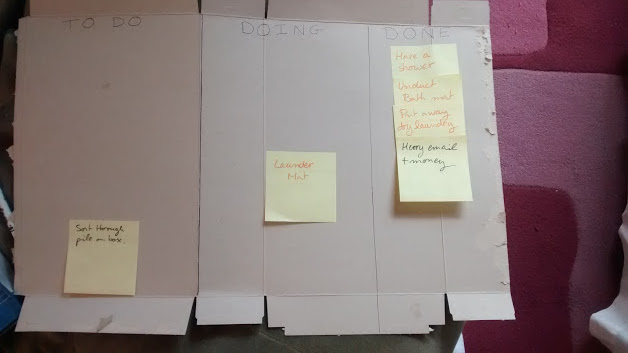I spent last week with a friend, trying to help him spring clean his house. He’s been struggling with feeling overwhelmed with all the complexities of life, and wanted some external help.
“Being lean” isn’t reading a book. “Being lean” is “being lean”. [1]
Key principles to articulate:
- Limit work in progress – e.g. do one thing at a time
- Make it visual – e.g. through a physical board and colourful post-its
- Keep inventory small – e.g. don’t waste time writing out the 50 things you wish were doing already, just write down the first 5 and crack on
- Sustainability is important – both in terms of pace and what happens after you (the trainer) are gone
You’ll notice the above are all “for example” rather than “this is exactly how you must do it.” As a coach, and as a mathematician, I don’t care how you do it, I care that it is smart. And the above principles are either psychologically or mathematically sensible. This is also why the role of Scrum Master does not make sense, but Agile Coach perhaps does.
Cue Kanban board!

Especially with novices, this doesn’t need to take very long. As you can see, the above has been assembled (by the trainee) using a cereal box. It is very important the trainee does it themselves, so they feel ownership.
Contrary to popular belief, smaller is better. Small tasks make it feel more sustainable, and help give more endorphins as you move to “Done” more frequently. Just like a production line, which is where Kanban was famously popularised. [2]
Supporting others in their lean journey is about giving them tools, not doing things for them. If your friend wants their house clean, it might help in the short term to clean their house for them: but it will just get dirty again. The essence of this is something like “Give a man a fish and you feed him for a day, teach a man to fish and you feed him for a lifetime”, and it extends further to “Why are you eating fish?” and “Have you thought about farming?”
It is much smarter to give them the ability and motivation to clean it themselves, and techniques and motivation to keep it up once it is in a reasonable state. Better still is to give them the broader desire and ability to reflect more fully, to understand why this matters to them and how it helps them on a deep level (psychologically, spiritually, philosophically, e.t.c.) Or maybe it doesn’t and they shouldn’t be prioritising doing it.
Motivation is key. Without it, there would be nothing done. As a coach, your role is about inspiring more than anything else. If you can build a sustainable flame in someone, they can easily google the rest.
[1] https://xkcd.com/703/
[2] http://www.toyota-global.com/company/vision_philosophy/toyota_production_system/just-in-time.html
I keep reading your posts in like them – in case you need motivation 😉
Not to object that motivation is key, but I’m wondering of whether motivation can be sustainable? Or maybe we need to add discipline and habits to it so it’s sustainable? I’ve heard an advice, which still sounds sensible to, that once we have motivation we should use it more to build habits/discipline around the topic rather on progressing the topic itself to build sustainability (and one habit could be coming back to source of the motivation because the more motivation the less discipline needed). I think it works for me well but I don’t see easy way to apply it as coach yet.
And thank for pointing out how building capability and ‘motivation to continue’ fits into it.
LikeLiked by 1 person
Thanks Lukasz,
Similar to the advice you’ve heard, my thoughts would only be a logical guess too: I’ve not seen any science on this. Intuitively, motivation itself is likely to change, and to have the ability to harness that is probably the important thing. In the same way that a tech company might need to change direction: perhaps the important thing is to have a change-embracing culture.
LikeLike